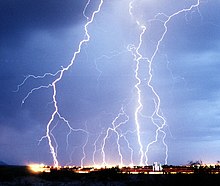Ìtanná: Ìyàtọ̀ láàrin àwọn àtúnyẹ̀wò
| Ìlà 104: | Ìlà 104: | ||
* Benjamin, P. (1898). [http://books.google.com/books?id=VLsKAAAAIAAJ A history of electricity (The intellectual rise in electricity) from antiquity to the days of Benjamin Franklin]. New York: J. Wiley & Sons. |
* Benjamin, P. (1898). [http://books.google.com/books?id=VLsKAAAAIAAJ A history of electricity (The intellectual rise in electricity) from antiquity to the days of Benjamin Franklin]. New York: J. Wiley & Sons. |
||
==Ajapo ode== |
|||
| ⚫ | |||
{{Wiktionary}} |
|||
* [http://books.google.com/books?id=n-MDAAAAMBAJ&pg=PA772&dq=Popular+Mechanics+1931+curtiss#v=onepage&q&f=true "One-Hundred Years of Electricity", May 1931, Popular Mechanics] |
|||
* [http://www.hometips.com/hyhw/electrical/electric.html Illustrated view of how an American home's electrical system works] |
|||
* [http://users.pandora.be/worldstandards/electricity.htm Electricity around the world] |
|||
* [http://amasci.com/miscon/elect.html Electricity Misconceptions] |
|||
* [http://www.micro.magnet.fsu.edu/electromag/java/diode/index.html Electricity and Magnetism] |
|||
* [http://steverose.com/Articles/UnderstandingBasicElectri.html Understanding Electricity and Electronics in about 10 Minutes] |
|||
* [http://water.worldbank.org/water/publications/water-electricity-and-poor-who-benefits-utility-subsidies/ World Bank report on Water, Electricity and Utility subsidies] |
|||
| ⚫ | |||
{{Link FA|ar}} |
|||
{{Link GA|ja}} |
|||
[[af:Elektrisiteit]] |
[[af:Elektrisiteit]] |
||
Àtúnyẹ̀wò ní 07:19, 13 Oṣù Kàrún 2012
| Ìṣegbéringbérin oníná |
|---|
 |

Ìtanná (Electricity) ni sayensi, iseero, oroiseona ati àwon isele eleda to je mo bi awon adijo ina se wa ati bi won se un sanlo. Itanna unfa orisirisi isele onitanna, bi monamona, ina ojukan, ifasara onigberingberin onina ati isanlo iwo onitanna ninu waya onitanna. Bakanna, itanna gba idasile ati igbasodo iranka onigberingberin onina bi awon iru radio laye.
Ninu itanna, awon adijo unse awon papa onigberingberin onina ti won unsise lori awon adijo miran. Itanna unsele nitori orisirisi awon iru isiseeda:
- adijo itanna: ini awon igbonwo abeatomu melo kan, to unso bi ibasepo onigberingberin onina won yio se ri. Awon elo ti won ti je didijo lonitanna yio je ninipa lori latowo awon papa onigberingberin onina be sini yio tun pese won.
- iwo itanna: isan awon igbonwo ti won ti je didijo lonitanna, won saba je wiwon ni eyo ampere.
- papa itanna (e wo isiseojukan onina): iru papa onigberigberin onina agaga kan ti ko soro to je dida latowo adijo itannna kan sibesibe bi ko ti le sún (eyun pe ko si ìwọ́ itanna). Papa itanna unda ipá lori awon adijo miran ti won wa nitosi re. Awon adijo ti won ba unsún na tun unpese papa onigberingberin.
- iniagbara itanna: eyi ni agbara ti papa itanna ni lati le se ise lori adijo itanna kan, eyi unsaba je wiwon ni volt.
- àwọn gbéringbérin oníná: iwo initanna unfa papa gberingberin wa, be sini papa gberingberin to unyipada unfa iwo onitanna wa.
Ninu iseero onitanna, itanna unje lilo fun:
- agbara itanna (eyi le tokasi bi okun iniagbara onitanna ba se posi tabi si energy per time|okun onitanna larin aiko kan) to wa fun lilo, latodo ile-ise onitanna. Bakanna, "itanna" le je lilo bi oro fun "sisomo waya fun itanna" to tumosi isopomora isise mo ibuso agbara ina. Iru isopomora bahun fun awon alo "itanna" ni aye si papa itanna to wa ninu isopowaya itanna, ati bi be si agbara itanna.
- isiseonina da lori awon asoyipo onitanna ti won ni awon ohun inu alagbese onitanna bi awon igo adepa, awon tiransisto, awon adojuona ati awon asoyipo olodidi, ati awon oroiseona to ba sepo.
Electrical phenomena have been studied since antiquity, though advances in the science were not made until the seventeenth and eighteenth centuries. Practical applications for electricity however remained few, and it would not be until the late nineteenth century that engineers were able to put it to industrial and residential use. The rapid expansion in electrical technology at this time transformed industry and society. Electricity's extraordinary versatility as a means of providing energy means it can be put to an almost limitless set of applications which include transport, heating, lighting, communications, and computation. Electrical power is the backbone of modern industrial society, and is expected to remain so for the foreseeable future.[1]
The word electricity is from the New Latin ēlectricus, "amber-like"[a], coined in the year 1600 from the Greek ήλεκτρον (electron) meaning amber, because electrical effects were produced classically by rubbing amber.

|
Àyọkà yìí tàbí apá rẹ̀ únfẹ́ àtúnṣe sí. Ẹ le fẹ̀ jù báyìí lọ tàbí kí ẹ ṣàtúnṣe rẹ̀ lọ́nà tí yíò mu kúnrẹ́rẹ́. Ẹ ran Wikipedia lọ́wọ́ láti fẹ̀ẹ́ jù báyìí lọ. |
Akiyesi
- ↑ Jones, D.A. (1991), "Electrical engineering: the backbone of society", Proceedings of the IEE: Science, Measurement and Technology, 138 (1): 1–10, doi:10.1049/ip-a-3.1991.0001
Itokasi
- Bird, John (2007), Electrical and Electronic Principles and Technology (3rd ed.), Newnes, ISBN 0-978-8556-6 Check
|isbn=value: length (help) - Duffin, W.J. (1980), Electricity and Magnetism (3rd ed.), McGraw-Hill, ISBN 0-07-084111-X
- Edminister, Joseph (1965), Electric Circuits (2nd ed.), McGraw-Hill, ISBN 07084397X Check
|isbn=value: length (help) - Hammond, Percy (1981), "Electromagnetism for Engineers", Nature, Pergamon, 168 (4262): 4, Bibcode:1951Natur.168....4G, ISBN 0-08-022104-1, doi:10.1038/168004b0
- Morely, A.; Hughes, E. (1994), Principles of Electricity (5th ed.), Longman, ISBN 0-582-22874-3
- Naidu, M.S.; Kamataru, V. (1982), High Voltage Engineering, Tata McGraw-Hill, ISBN 0-07-451786-4
- Nilsson, James; Riedel, Susan (2007), Electric Circuits, Prentice Hall, ISBN 978-0-13-198925-2
- Patterson, Walter C. (1999), Transforming Electricity: The Coming Generation of Change, Earthscan, ISBN 1-85383-341-X
- Sears, Francis W.; et al. (1982), University Physics (6th ed.), Addison Wesley, ISBN 0-201-07199-1
- Benjamin, P. (1898). A history of electricity (The intellectual rise in electricity) from antiquity to the days of Benjamin Franklin. New York: J. Wiley & Sons.
Ajapo ode
- "One-Hundred Years of Electricity", May 1931, Popular Mechanics
- Illustrated view of how an American home's electrical system works
- Electricity around the world
- Electricity Misconceptions
- Electricity and Magnetism
- Understanding Electricity and Electronics in about 10 Minutes
- World Bank report on Water, Electricity and Utility subsidies
